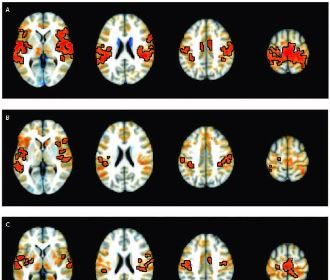Cognitive Testing, Politics, and the Very Real Issue of Alzheimer’s Disease and Dementia

WASHINGTON – For weeks it had been the stuff of living room banter and fodder for self-quarantining late night comedians.
Suddenly, apparently on a whim, the president who once described himself as a “very stable genius,” was talking about how he “aced” a mental fitness test.
He even turned his success into something of mantra, repeating the words “Person. Woman. Man. Camera. TV,” and offering it as a sample answer of the actual cognitive test he said he took two years ago.
Then on Tuesday, scientists announced that a long-sought blood test for Alzheimer’s disease could be available for use in a few years, a major breakthrough that is expected to speed research into treatments, while also making diagnosis simpler, more affordable and widely available.
The research, published in the Journal of the American Medical Association and presented at the Alzheimer’s Association International Conference, identified signs of the degenerative disease 20 years before memory and cognitive problems were expected to show in people with the genetic mutation that causes Alzheimer’s.
Such a test could be available for clinical use in as little as two to three years, the researchers said. It could also help practitioners better diagnose whether a patient is actually experiencing Alzheimer’s or has another cognitive issue.
This is big, big news.
Today, Alzheimer’s disease and related dementias (ADRD) currently affect over 5.5 million Americans and over 35 million people worldwide. It is expected that the number of cases will continue to increase as the number of people over age 65 continues to increase.
According to a recent paper by Dr. James Galvin, a University of Miami professor of neurology who runs a dementia center in South Florida, more than one in eight adults over age 65 has dementia, and current projections indicate a threefold increase by 2050.
In addition to ADRD, many older adults suffered from multiple medical conditions — heart disease, stroke, and depression, among them — that can affect cognitive abilities, behavior and daily functioning.
“Over the next two decades, the number of people over age 65 is expected to grow by 62% and the number over age 85 is expected to grow by 84%,” Galvin wrote. “Thus, the prevalence, incidence, morbidity, and mortality for ADRD will increase dramatically and the societal financial burden of illness and dependency will expand exponentially.”
Wanting to learn more, The Well News reached out to Dr. Galvin. The conversation began with the President’s cognitive assessment test, which is believed to have occurred in 2018.
At the time the president was furious over his depiction in the book “Fire and Fury: Inside the Trump House,” in which journalist Michael Wolff described some White House advisers questioning his fitness for office.
Afterward, Dr. Ronny Jackson, who was then White House physician and is now a candidate for Congress, reported the president had received a score of 30 out of 30 on the Montreal Cognitive Assessment (MoCA).
Galvin said the MoCA is one of a number of brief tests that are used by doctors to get a quick assessment of “where things are” for a patient.
“It’s a snap shot,” he said. “It gives you a baseline of basic information which can assist you to make decisions — what’s the next step?”
“Dementia is a condition that occurs mostly in older adults, and so when we’re seeing someone over the age of 65, we do these brief tests which gives us a best clinical guesstimate of how they’re doing cognitively, and if a more extensive evaluation is warranted,” he said.
“Now, among the things to remember about these tests is that they are designed to be appropriate for different populations,” Galvin continued. “For instance, if you give a test designed for 80-year-olds to a 20-year-old, they’re going to do quite well on it. The same thing happens if you give someone a test designed to pick up dementia and they don’t have dementia — they’re going to do well.
“These tests are designed to capture a problem, which is very different from an IQ test or a mental acuity test, where you try to pick up sharpness,” he said.
“In an IQ test, the more questions you answer correctly, the higher your IQ. Screening tests for dementia are designed differently. In their case, a lower score tells you that someone has dementia; higher scores don’t tell you anything about the person, other than statistically reduce the probability that he/she does not have a cognitive impairment” he added.
Galvin went on to explain that to understand the results of the screening test, a doctor has to look at the person as a whole, and take factors, like their age, education level or primary language, into account.
“If someone is an astrophysicist, you’d expect them to get a 30 [the top score on the MoCA test], and you’d expect someone with no more than an eighth grade education to score lower, maybe only in the low-to-mid 20s,” he said. “In fact, we add a point to the MoCA if the individual has 12 or less years of schooling. So you have to take these things into account. There are people who score a 30 and have Alzheimer’s disease, and people who score 22 and don’t, because of the other factors that come into play. The score itself gives you just the starting point of the conversation.”
In short, interpreting what a cognitive assessment test means is a clinical decision call. People who are specialists may do additional neuropsychological testing to better inform that decision. Primary care providers may refer to specialists.
Why Was The President Tested?
“The unanswered question around the President’s test is we don’t know why it was administered,” Galvin said. “I assume it was Ronnie Jackson who administered it, but we don’t know why, per se.
“In general, the Medicare guidelines for an annual wellness visit suggest part of the visit should include a cognition assessment, but there’s no prescription for how it’s done,” he said. “That is part of why there’s a proliferation of these brief screening tests that can be used in the doctor’s office setting … and that could have been why Jackson administered the test. But we don’t know. I find it hard to believe the President would specifically ask to have a dementia test done.”
“The other part of the conversation we’re all having about the President’s test — and I’m saying this from a completely nonpolitical perspective — is that one of his traits is that he likes to boast about his accomplishments (as do many people). Scoring well on the test could be such an example.
“And you know, a lot of people have tests done in a doctor’s office that they don’t really understand in terms of why they were done or what the results may mean, or not mean. … so, I think part of how the President has talked about the test might be attributed to that.
“And then, of course, there’s his interaction with the media. The President says something and it gets blown up … by both sides. There’s a liberal take on it and a conservative take on it, and there are often entirely different interpretations of the same piece of information,” he said.
We would touch on the President’s cognitive assessment test again later. But first the conversation turned to members of Congress. As the coronavirus pandemic laid bare, many members of the House and Senate are quite old, and many also suffer from a variety of physical ailments.
Should there be some kind of requirement that those interested in running for office submit to a cognition assessment?
Galvin paused to collect his thoughts.
“I think it’s prudent in older adults because they are the ones at the highest risk for dementia, and you know, we did have a President [Ronald Reagan] who was diagnosed with Alzheimer’s disease after he left office. It is possible that some of the early signs of dementia may have been present in the latter part of his second term,” he said. “I mean, it’s hard to know for sure, I was a kid when Reagan was President, but what I remember about him is that he was this dynamic and powerful speaker who commanded the room, and towards the end he seemed different. Things seemed to be happening that he had little control over, such as the Iran-Contra issue.
“Now, years later, being a dementia specialist, I would say that this could have been an early clue that maybe some things were happening. But, you know, I’m playing Sherlock Holmes here,” he said.
“Now, to your question. Our current President is the oldest president ever. And the next president will be the oldest President ever — whether it’s because our current President is re-elected or his Democratic opponent is elected. Either one is going to be the oldest man elected President. And the risk of Alzheimer’s disease in that age group is somewhere on the order of 25%.
“So, I think you would want to know whether your President has dementia. I mean, you’d want to know if your lawyer has dementia, or your doctor or your car mechanic, right? Because you want to know whether they’re capable of doing the job,” he said.
“I mean, when Strom Thurmond was sitting in his chair on Capitol Hill at 98, was he as sharp as we’d hope he was? I don’t know.”
Should Members of Congress Be Tested?
Returning to the idea of whether older members of Congress should have a regular cognitive assessment test, Galvin said it’s up to the individual member and their doctor.
“And you know, there’s a law called HIPAA, so it’s an entirely private personal decision,” he said. “Even if they had the assessment, they don’t have to share anything. So, I think the real question is, if there is a problem, what measures can you take to fix the problem?
“In the case of the President, you have the 25th Amendment that says you can remove the President if he becomes disabled and can’t carry out his duties. But I don’t think there are similar stipulations for Congress … so if someone did a test and it was discovered there was a problem, they don’t have to disclose it. So, there is no solution,” he said. “At that point it’s your personal business and up to you and your family to make the best decision for you.”
Galvin again emphasized that he was not trying to be political at all in his comments. “Whatever my personal view is, whatever your personal view is, I’m really not trying to address that. The question simply is, if the test was done that the President said was done, I would want to know why it was done.
“If I could find that out, and find out the actual results, I can tell you whether it’s being skewed both by the person who took the test and the press,” he said. “I mean, the last questions on the test are, “tell me the day, date, month, year, and city or place of the exam.”
“Those are not hard questions. But they are hard questions for someone who has Alzheimer’s disease,” he added.
“The other thing I question is this description that’s out there that if you get certain words in order, you get more points. The whole ‘Person. Woman. Man. Camera. TV.’ thing. That’s not true. There is no cognitive assessment test that gives you more points for getting things in order.
“We want to see you repeat and remember those five words. You don’t have to get them in order. We don’t even count whether you got them in order, there’s no place on the test to score that,” he said. “ We do look for whether you can remember them on your own, or if you need clues to jog your memory.”
Galvin suggested part of why Trump’s repeated references to his cognitive assessment may inspire skepticism in some is that he was striving to make a point.
“As an observer, I can’t say he made an intentionally false statement. I don’t know that. He’s basically trying to tell you he aced the test, right? He may not necessarily know that you can’t “ace” a test like this.
“Again, it comes down to the difference between tests of knowledge and acuity and IQ. You can ace those, they are designed to determine how “smart” or “intelligent” you are. This is not one of them. A cognitive assessment test is counting how poorly you do, not how well … because the ceiling is easily attainable by people who don’t have dementia,” he said.
With that, Galvin returned to the press conference at which the president first recited the words “Person. Woman. Man. Camera. TV.”
“Does he really remember those five words? Does he really remember what he got ‘right’ on a brief test he took a year and a half ago,” Galvin said. “What difference does it make? He’s trying to illustrate a point he’s making … and he’s looking out at what’s in front of him, seeing a camera, a TV or monitor, a man and a woman, and he’s probably just using that as an example.
“Now, I know, as a clinician, that in all likelihood those particular 5 words weren’t part of his test, but giving him the benefit of the doubt, he was just trying to illustrate a point. And people will take that and do whatever they want with it,” he said. “And it doesn’t matter whether it was President Trump or Obama or Clinton or Reagan. One side is going to take it as this, and one side is going to take it as that.”
The Promise of a New Test for Alzheimer’s Disease
With that attention turned to the promise of a blood test for Alzheimer’s disease, which could provide those treating patients with Alzheimer’s and Dementia a new window into the pathology behind the disease.
“Until recently there had not been a lot of ways of getting to the pathology behind these conditions, other than doing autopsies after the patients were dead,” Galvin said. “More recently, we’ve been able to use nuclear medicine scans to see the amyloid plaques in the brain or we can do a spinal tap to measure the protein in the spinal fluid, but PET scans are expensive and not readily available everywhere in the country and people are slow to have spinal taps … so the big push has been to develop a blood test.
“The problem is that the proteins we’re looking for are present in very low levels in the blood. So, you need specialized instruments to amplify the signal enough to see it,” he said. “The paper presented yesterday focused on a way to do that down to a very minute level. And there are others. A number of companies are developing similar technologies. But none of these tests are clinically available. It’s all just research at the present time.
“But the idea is, if we had a reliable blood test, we would very easily screen people,” he continued. “I mean, imagine trying to diagnose diabetes without measuring blood sugar, or trying to diagnose hypertension without measuring blood pressure. That’s kind of where things stand now in this field.
“So, the idea is to come up with a test that’s readily accessible, that’s affordable and that will be reimbursed by insurance, and that’s why a lot of companies are trying to develop one,” he said.
What More Can Lawmakers Do?
Of course, talk of research, begs the question of government funding and what Congress can do to speed Alzheimer disease and dementia research.
“The good news is the National Institutes of Health, and particularly the National Institute on Aging have seen a large increase in their budget in the last five years to fund Alzheimer disease and related disorder research. So, there’s a been a big commitment from the government to increase research dollars,” Galvin said.
“Of course, researchers always want more research funding, right? That kind of goes without saying, but I will say there are other government agencies that deal with these issues that haven’t received as much funding,” he said. “These include AHRQ, the Agency for Healthcare Research and Quality, which develops screening guidelines, the Centers for Disease Control, the Centers for Medicare & Medicaid Services … and then there are things that don’t take more money, but government action to amend processes.
“I’m thinking specifically of the Food and Drug Administration, which has the final say on drug approvals,” he continued. “The question is always how do we get new drugs approved faster, without compromising safety. And then there’s an entirely different discussion on how health care should be paid for and delivered in this country. We seen that this year with talk of Medicare-for-all and single payer and proposed changes to the Affordable Care Act.
“Now, that’s not something to get into here, but the fact is most people in the United States who are diagnosed with dementia are already at a moderate stage of the condition before the diagnosis is made.
“That’s because there isn’t a level of access to care or readily available systems in place to capture the conditions in their early stages,” Galvin said. “So you see, money can be spent on this in many, many, many ways … and not just on basic science research.
“Unlimited money could probably solve a lot of the problem, but still wouldn’t solve all of them,” he said. “Because once you got enough money to satisfy people in my field, you’d have an heart disease specialist wanting an unlimited amount of money for their research, and the same argument for unlimited money will be made by advocates for the environment, the homeless, the jobless … people concerned about food deserts and food availability.
“So, to answer your question. There is funding to do research, and that’s great. And I think, we don’t always need money to fund more research, we need money for the implementation side as well, for the part that translates research findings into clinical care. “That’s sort of the translational part of it and that’s a lot harder to get going. I mean, how do you translate a finding in a mouse to a finding in a human? And how do you translate a finding in the human being to a policy? And who pays for that?” Galvin said.























